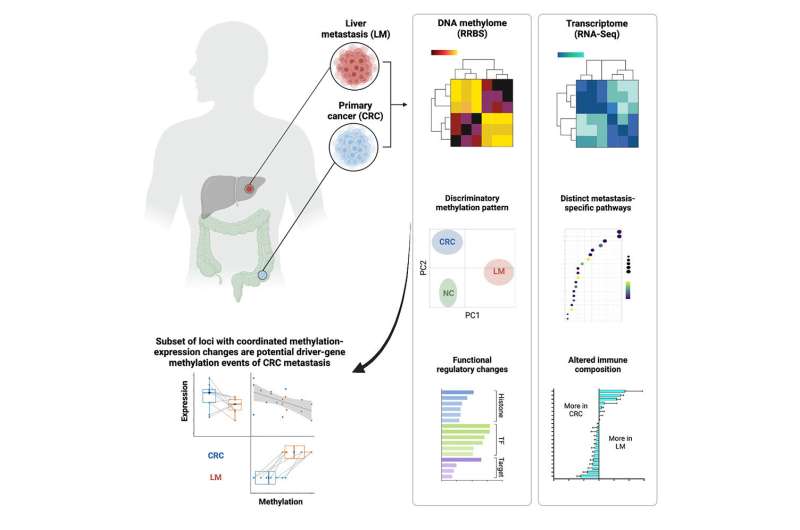This article has been reviewed according to Science X's editorial process and policies. Editors have highlighted the following attributes while ensuring the content's credibility:
fact-checked
peer-reviewed publication
trusted source
proofread
DNA discovery may assist in fight against aggressive cancer

In a significant development in the fight against fatal cancers, University of Otago researchers have pinpointed a key feature that leads to the aggressive spread of colon cancer.
Led by Associate Professor Aniruddha Chatterjee and Drs Euan Rodger and Rachel Purcell, researchers discovered abnormalities in the DNA instruction code that lead to the aggressive spread of colorectal (bowel) cancer—Aotearoa's second highest cause of cancer death.
Dr. Rodger says the finding published in the journal iScience is a significant step towards the detection and prevention of tumors that spread or grow rapidly.
The main cause of cancer-related death is the spread of tumors to distant organs, referred to as metastasis.
"Despite this profound impact, how tumors become metastatic and so deadly, and what is different about these tumor cells remains largely unknown. The DNA instructions—the blueprint of a cell—and how and where these instructions go wrong in cancer cells provide important clues in understanding why this happens," Dr. Rodger says.
Methylation—a chemical modification of DNA—can control how the DNA code will behave in a cell. Therefore studying DNA methylation levels (also referred to as the epigenetic code) in the lab and in patient tumor samples has the potential to understand metastasis and utilize the knowledge for patient benefit.
The research team studied the DNA methylation map and also how the DNA behaves in bowel cancer patients. In each of 20 patients, they then analyzed clinical samples from the primary colon tumor and the tumors that had spread to the liver.
"We have discovered almost 300 gene regions that show distinct DNA methylation levels in liver metastasis," he says.
"These changes are unique to aggressive liver metastasis and are not present in primary tumors or in normal colon. The genes that have the unique methylation signature have important functions in cells.
"This work shows that cancer cells could use unique methylation patterns to become aggressive."
Associate Professor Chatterjee says the finding is particularly significant for Aotearoa where 1,200 people die from bowel cancer every year.
"Patients with distant metastases, such as liver metastasis as we have studied in this work, unfortunately have very low five-year survival rates.
"Alarmingly, the incidence of colorectal cancer is increasing in people under 50 years old and in Māori and Pasifika populations at a faster rate. Māori and Pasifika are also more likely to present directly to emergency departments with advanced colorectal tumors," he says.
"Our work will open new avenues for understanding why cancer cells become so aggressive and will lead to better outcome prediction and new targets to treat these tumors in the future." Associate Professor Chatterjee and Dr. Rodger will undertake more research on metastatic cancers.
More information: Euan J. Rodger et al, An epigenetic signature of advanced colorectal cancer metastasis, iScience (2023). DOI: 10.1016/j.isci.2023.106986



















